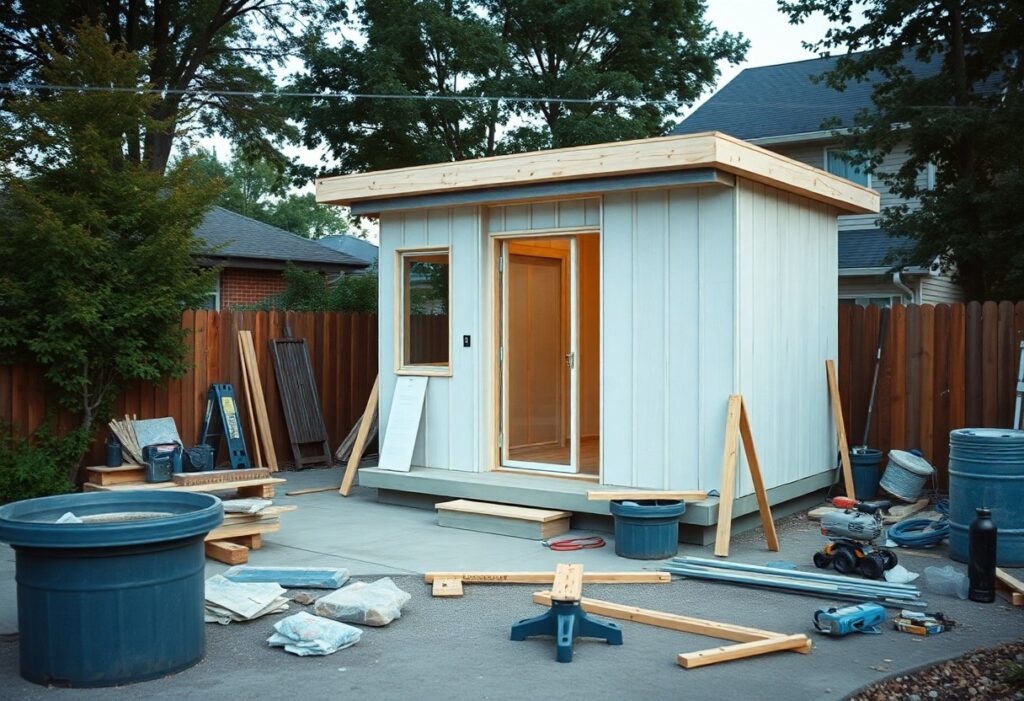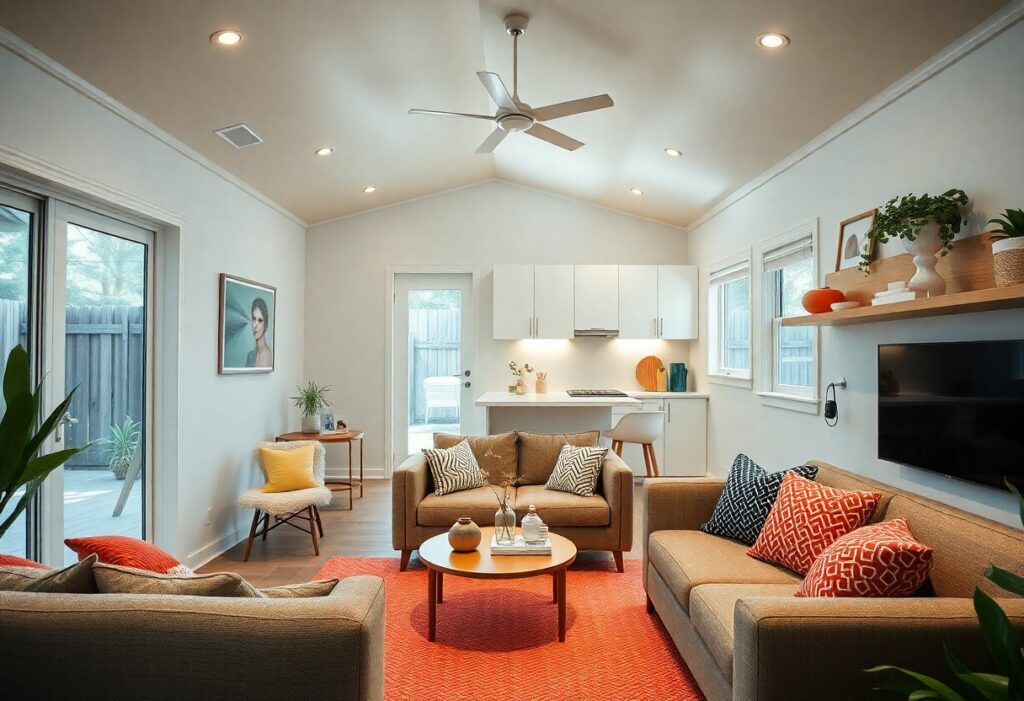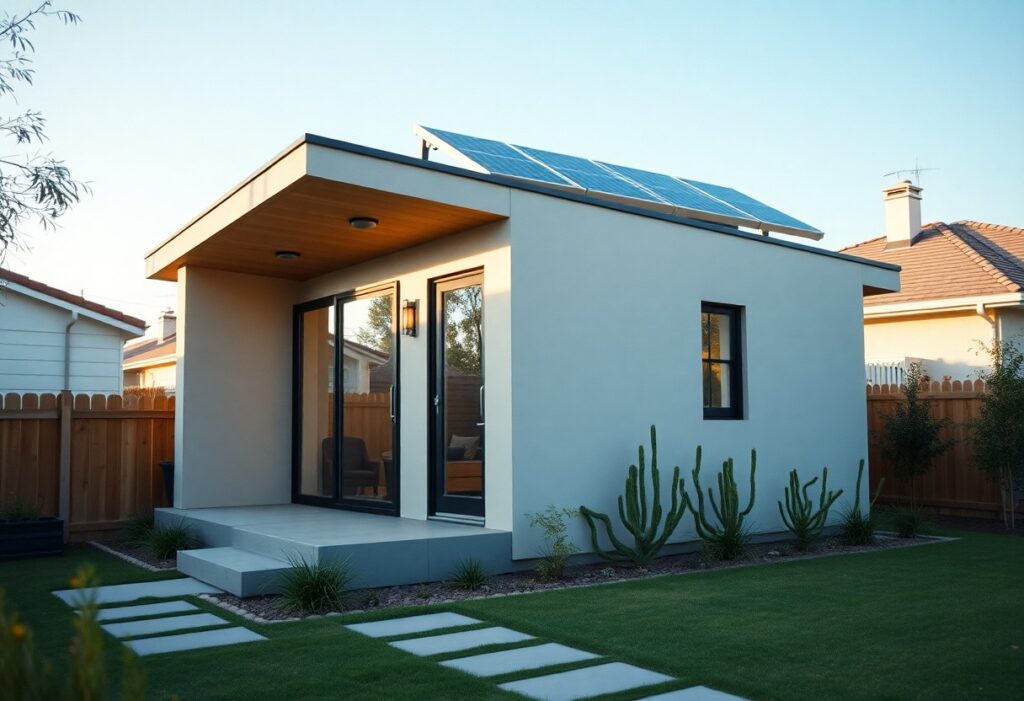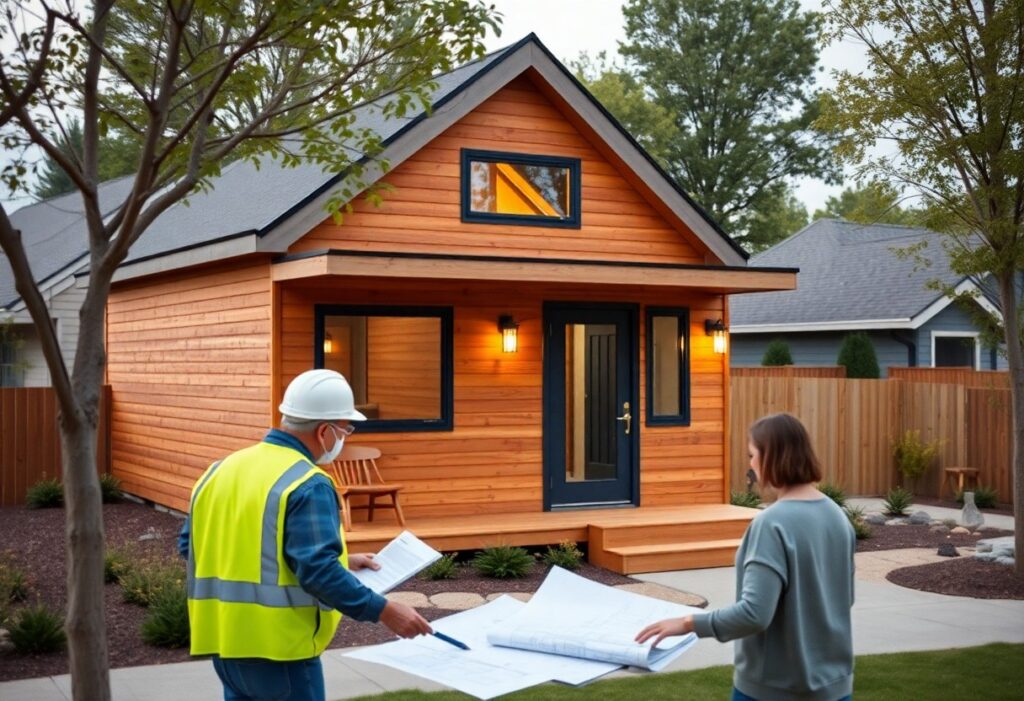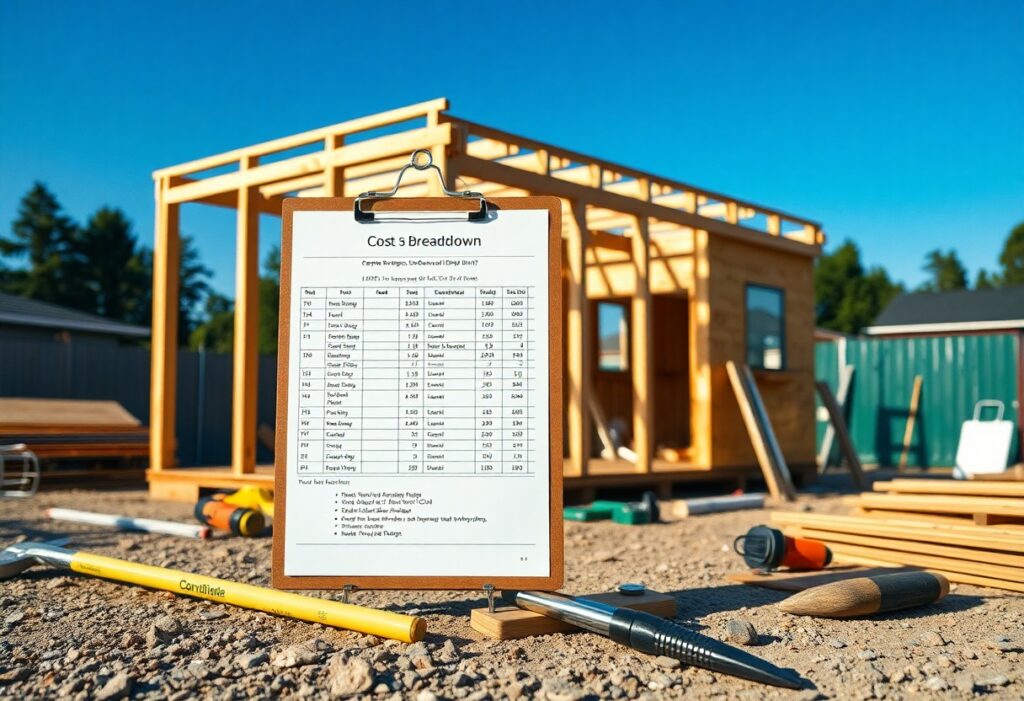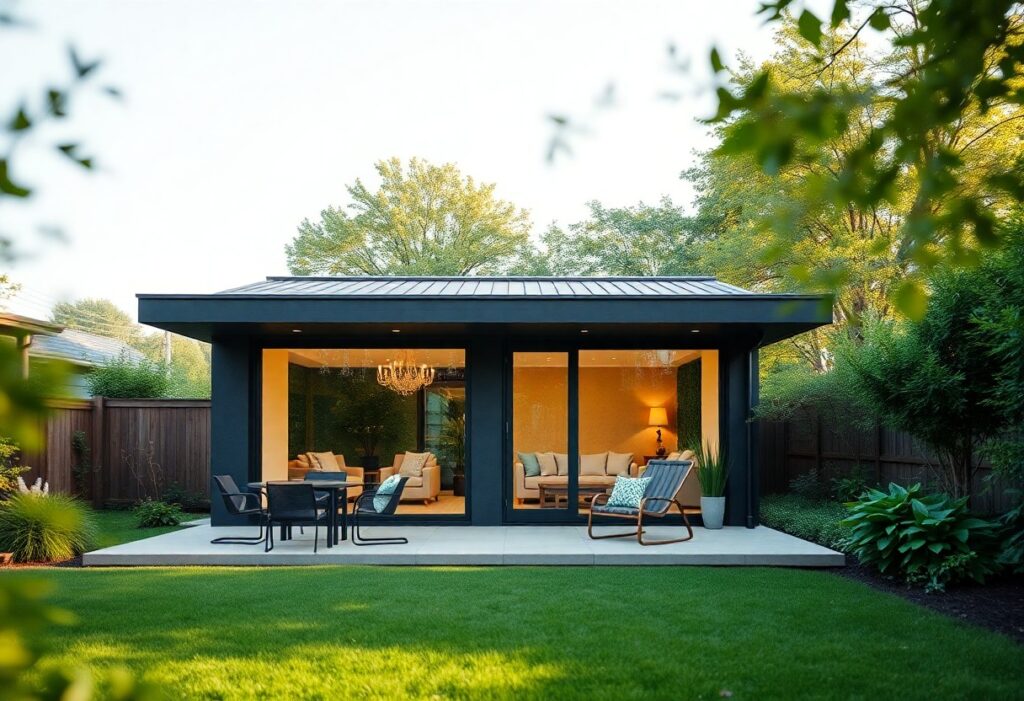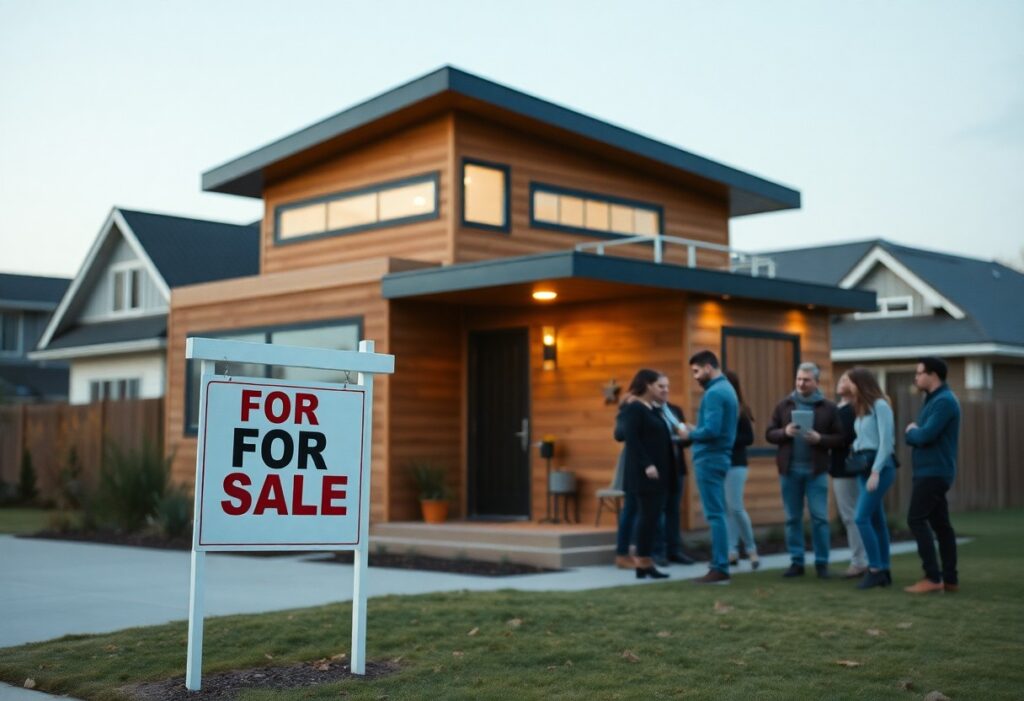Planning your Accessory Dwelling Unit (ADU) budget is necessary for a successful project. As you navigate costs such as construction materials, labor fees, and permitting expenses, it’s important to establish a realistic financial plan that can accommodate any unforeseen challenges. This allows you to maximize your investment while avoiding common pitfalls that could lead to overruns. By being proactive and informed, you can create an ADU that enhances your property and meets your needs without stretching your finances too thin.
Key Takeaways:
- Determine Costs: Identify all potential expenses associated with building an ADU, including materials, labor, permits, and utilities.
- Budget Flexibility: Plan for unexpected expenses by including a contingency fund in your budget to cover any unforeseen costs.
- Explore Financing Options: Research various funding sources such as personal loans, home equity lines of credit, or state and local programs to finance your ADU project.

Understanding Accessory Dwelling Units (ADUs)
To fully grasp the concept of Accessory Dwelling Units (ADUs), it’s imperative to recognize how they serve as secondary housing options on residential properties. These self-contained living spaces can exist in various forms, including basement suites, backyard cottages, or converted garages, allowing for increased flexibility in housing arrangements.
Definition and Purpose
Before diving deeper, it’s important to define ADUs. They are smaller, independent residential units located on the same lot as a primary home. Their purpose is to provide additional living space, catering to a wide range of needs, from multigenerational living to rental opportunities.
Benefits of ADUs
An ADU offers numerous advantages that can positively impact your lifestyle and financial situation. These units enhance property value, create housing for family or friends, and serve as lucrative rental income sources.
Benefits of ADUs are abundant, especially when you consider their potential to significantly increase your property value and generate additional income. They provide imperative affordable housing options, enabling you to accommodate family, friends, or renters without the need for a separate home. Furthermore, their relatively lower construction costs compared to building a new house can make them a smart investment. By adding an ADU, you effectively maximize your property’s utility, offering flexibility and fostering community in your own backyard.
Factors Influencing Your ADU Budget
It’s important to consider various factors that influence your ADU budget. These elements can significantly affect the overall cost and include:
- Location
- Size and design
- Permitting and zoning fees
- Materials and finishes
- Contractor fees
The right approach can help you manage these variables effectively.
Initial Cost Estimates
Below are some typical initial cost estimates you should factor into your ADU budget. The costs vary widely depending on your chosen design, location, and whether you opt for new construction or an existing structure.
Financing Options
Among the various financing options available for your ADU project, you might want to consider personal loans, home equity loans, or even specific financing programs dedicated to accessory dwelling units.
But navigating financing can be overwhelming. You should weigh the benefits and drawbacks of each option. For example, personal loans can offer quick access to cash but may have higher interest rates. Meanwhile, home equity loans usually provide lower rates but require substantial equity. Additionally, some local governments or private institutions may offer special financing programs with favorable terms, specifically for ADUs. Understanding these options will better equip you to make informed financial decisions.
Cost Breakdown
Your ADU project costs can vary significantly, so understanding the breakdown is vital for effective budgeting. Consider all variables, including land, permitting, construction, and utilities. Each component plays a vital role in determining your total expenses, and tracking these costs closely will help you stay within your budget during the entire process.
Land and Permitting Fees
Breakdown of fees related to land acquisition and required permits can quickly add up. Researching local zoning laws and obtaining necessary approvals might include costs for property surveys, environmental assessments, and application fees. Allocating a portion of your budget to address these expenses from the start can prevent unwanted financial setbacks down the line.
Construction and Design Expenses
Before you probe the nitty-gritty of your ADU project, it’s vital to outline the anticipated costs for construction and design. This can include hiring architects, securing contractors, and acquiring materials, all of which directly influence your final bill.
Indeed, prioritizing high-quality design and skilled labor is vital, but it will impact your budget. Quality materials can enhance the longevity of your ADU, while professional design can optimize space and functionality. However, be prepared for fluctuating market prices for labor and materials, as they may lead to unexpected increases in your overall expenses.
Utility Considerations
Fees for utility connections or upgrades are vital to consider when planning your ADU. Ensure you don’t overlook expenses such as water, electricity, gas, and sewage to avoid unexpected financial strain during your project.
Considering utility needs in advance allows you to plan effectively. These outside connections can significantly impact your project budget, especially if upgrades to existing lines or systems are necessary. It’s also wise to account for ongoing utility costs once your ADU is complete to ensure financial sustainability moving forward. Planning for these needs will create a smoother transition into your new space.
Budgeting Tips and Best Practices
For effective budgeting, start by outlining your financial limits and prioritizing your expenses. Consider the following tips:
- Assess your financing options.
- Include a buffer for unexpected costs.
- Research and compare contractor quotes.
- Track expenses diligently throughout the process.
Any adjustments you make can significantly improve your financial control over the ADU project.
Creating a Detailed Budget
Budget creation involves breaking down every element of your ADU project into clear expenses. Begin with major categories such as permits, construction, and finishes. Allocate funds for each category, ensuring to include a contingency fund for unexpected costs. The more detail you provide, the better prepared you will be for your financial responsibilities.
Accounting for Contingencies
Detailed budgeting means you should also factor in potential unexpected expenses. These can arise from various sources, such as labor increases or material price hikes. Ignoring these could lead to significant stress during the project.
At the outset of your budget planning, it’s wise to set aside around 10-20% of your total budget for contingencies. This reserve can protect you from the financial impact of unforeseen expenses that may arise, ensuring your project stays on track. Evaluating the risks associated with projects such as this can uphold your financial stability and allow for smoother transitions should any challenges occur. The goal is to keep your project under budget while maintaining quality and meeting your desired standards.
Maximizing Your Investment
Not only does building an ADU provide additional living space, but it can also significantly enhance the value of your property when planned wisely. Investing in the right features and amenities ensures that your ADU appeals to future tenants or buyers, making your investment even more worthwhile.
Potential Rental Income
Rental income can be a substantial benefit of adding an ADU to your property. Depending on your location, you could potentially earn a significant monthly rental fee, which can help offset your initial investment costs and provide ongoing income.
Increases in Property Value
Against the backdrop of an unpredictable real estate market, adding an ADU can lead to a notable appreciation in your property’s value. An ADU not only offers extra rental income but also appeals to a broader range of buyers. Even if you decide to sell in the future, the value added by an ADU can be significant, often covering up to 30% of your total investment. This ensures that you are not only recouping your costs but potentially seeing a profitable return, making it a wise long-term investment strategy.
Local Regulations and Zoning Laws
After deciding to pursue an Accessory Dwelling Unit (ADU), it’s vital to familiarize yourself with your local regulations and zoning laws. These rules govern what you can and cannot build on your property, and they vary significantly by location. Understanding the specific requirements in your municipality will not only inform your design but will also shape your budget. Non-compliance can lead to delays, fines, or the need for costly modifications, making it crucial to stay informed.
Importance of Compliance
With a thorough understanding of local regulations, you can build your ADU confidently and without unforeseen complications. Compliance ensures that your project adheres to safety standards, enhances property values, and avoids potential legal issues.
Variances and Permitting Processes
Around many areas, constructing an ADU may require navigating a complex variances and permitting process, which may include submitting plans and obtaining inspections.
Indeed, the variances and permitting processes can be intricate and time-consuming. You might need to seek a variance if your proposed ADU doesn’t meet specific zoning criteria, like setbacks or height restrictions. This process often involves public hearings and neighborhood reviews, which can extend your timeline. Furthermore, each step of the permitting process may incur additional fees, impacting your overall budget significantly. It’s advisable to prepare for possible delays and challenges, as securing the necessary approvals is vital to avoid complications and ensure your ADU is legally compliant.
Final Words
On the whole, determining your ADU budget requires a thorough understanding of your financial situation, project goals, and local building regulations. You should consider all potential costs, including construction, permits, and ongoing expenses, to create a realistic budget that aligns with your objectives. By doing so, you empower yourself to make informed decisions that will contribute to the success of your ADU project, ensuring it adds value to your property and meets your needs for years to come.
FAQ
Q: What factors should I consider when creating a budget for my ADU?
A: When creating a budget for your Accessory Dwelling Unit (ADU), consider several key factors: First, the cost of land, if applicable, and any existing foundation or infrastructure. Second, material costs can vary significantly based on quality and aesthetic preferences. Third, labor costs depend on the construction method and local market rates. Additionally, obtaining permits, conducting inspections, and any required design work should be accounted for. Finally, be sure to include a contingency fund for unexpected expenses that may arise during the build process.
Q: How can I ensure my ADU project stays within budget?
A: To keep your ADU project within budget, start by developing a detailed project plan outlining each phase of construction, materials needed, and estimated costs. Regularly review expenses against your budget and adjust as necessary. It’s beneficial to gather multiple quotes from contractors and suppliers to find the best prices without compromising quality. Additionally, consider setting aside a specific percentage of your budget as a safety net for cost overruns or changes to the project scope.
Q: What financing options are available for building an ADU?
A: There are various financing options for building an ADU, including traditional mortgages or home equity loans, which can provide the necessary funds based on the current value of your property. Some local governments offer grants or low-interest loans specifically for ADU projects, aimed at increasing affordable housing. Additionally, personal loans or savings can be considered if you prefer a less formal approach. It’s advisable to consult with a financial advisor to explore the best options tailored to your financial situation and goals.


